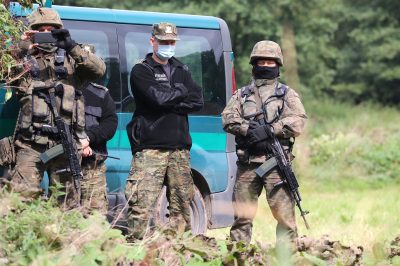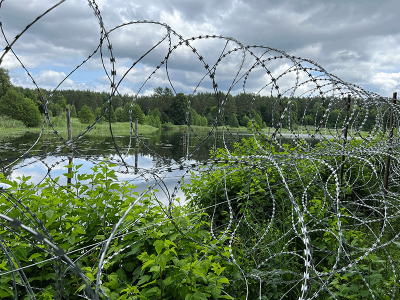
The current regime of guarded centres for foreigners, patterned after the military or prison regime, combined with external design and internal architecture of the facilities must be deemed oppressive, shows the report “Migration is not a crime” published by the Helsinki Foundation for Human Rights and the Association for Legal Intervention.
Both organisations hold the view that such a regime fosters an unacceptable behaviour among centres’ personnel (comprised of Border Guards officers), which may be seen as infringing the dignity of foreigners. They are, for instance, addressed by their identifications numbers or subjected to unreasonable threats of deportation.
The published report is a summary of the monitoring conducted by the Helsinki Foundation for Human Rights and the Association for Legal Intervention at the request of the Ministry of Interior following October’s protests of foreigners detained in guarded centres throughout Poland. The Ministry’s audit and the NGOs monitoring activities were carried out simultaneously in November 2012.
Among the individuals referred to guarded centres there are foreigners who stay in Poland without a valid residence permit and persons applying for a refugee status. “It must be expressly noted that foreigners are detained in guarded centres for administrative violations and they are not criminals”, says Karolina Rusiłowicz, a lawyer with the Helsinki Foundation for Human Rights.
The conducted monitoring revealed no material breaches of law committed by Border Guards and, more importantly, no cases of the officers beating or abusing any foreigners. Still, according to the Helsinki Foundation for Human Rights and the Association for Legal Intervention, it is necessary to amend the internal regulations of the centres, which in their current form are excessively restrictive and lead to undue interferences with the right to personal freedom and privacy of foreigners.
“One of our recommendations is to reduce the frequency of automatic strip searches to which centres’ residents are subject on too many occasions. During the search a foreigner is asked to stand naked while a body cavity inspection is conducted. For this reason, a strip search is a measure which substantially interferes with the privacy of the affected individuals”, says Dr. Witold Klaus, head of the Association for Legal Intervention. Both NGOs involved in the monitoring believe that similar objections could be raised against the search of foreigners’ rooms. Such searches should not be carried out as a standard procedure but their use should be confined to cases where there is a suspicion that a foreigner has dangerous or forbidden items.
The both organisations call for a number of changes in the way the centres operate. “What is important is to modify the internal and external design of guarded centres. They should be guarded on the outside but inside there should be as few elements indicating the closed status of these facilities as possible. If practicable, bars on windows or inside buildings should be removed”, says Ms Rusiłowicz. In the opinions of the NGOs foreigners should have the right to move around a facility and be allowed to spend their time outdoors beyond the scheduled times for outdoor exercise.
A problem reported by many foreigners is overwhelming boredom and lack of sufficient access to recreational activities, which has an extremely negative impact on their mood and general mental and physical state. “Therefore it is an imperative to give them access to various types of activities during their detention in a guarded centre”, says the report.
The HFHR and the Association for Legal Intervention once again draw their attention to the fact that guarded centres are hardly a place for children and thus detention of minors in such facilities ought to be absolutely prohibited. “It shall never be in the best interest of the child to be kept in detention due to reasons related to migration”, says Dr Klaus. Children are kept in guarded centres surrounded by barbed wire fences where playrooms have bars on the windows and access to education is not sufficient. “Certainly, these factors are not conducive to the child’s development”, adds Dr Klaus.


